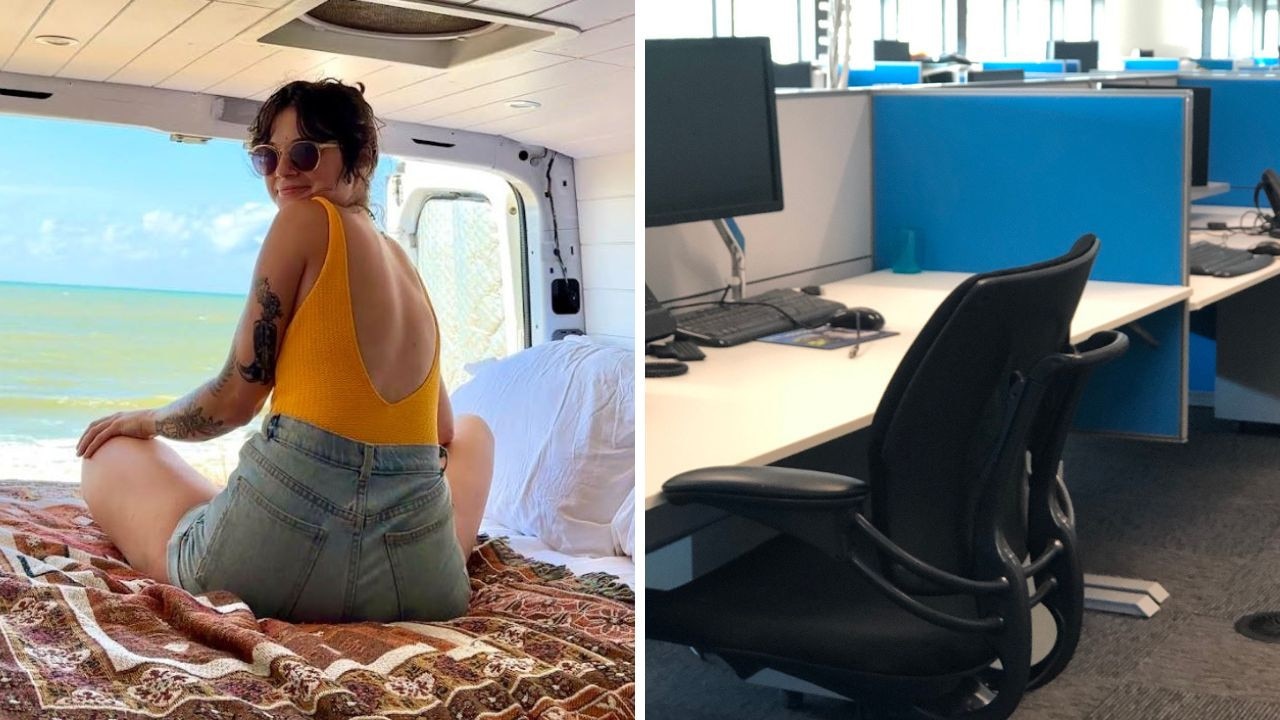Generation Z are moving away from office culture and becoming nomads
Generation Z don’t want to spend their lives working in offices, and are embracing a wild new way of working instead.

It is safe to say there’s been a cultural shift in the way young people forge their careers.
They want work to work for them, and their preference would be from anywhere in the world.
Carly Koemptgen, 26, is a prime example of this trend. She’s a digital nomad who quit her objectively successful life working at an agency to focus on her mental health.
Ms Koemptgen explained she felt “discouraged” and “unmotivated” in a traditional nine-to-five role, and she wanted to break free and avoid spending her twenties feeling burnt-out and looking at a computer screen all day.
“I realised I wanted to work to live rather than live to work, which is why I quit my full-time job and started freelancing,” she told news.com.au.

Getting away from the grind has allowed her the space to live life on her own terms. Instead of needing to be at a desk by 9am, she’s currently travelling around Australia and New Zealand in a van.
She’s not just another worker hoping to be sat near an office window. Instead, her view can be anything from the beach to the country landscape.
She claims the experience has taught her you don’t have to settle.
“Travelling around Australia and New Zealand in a van, it’s become clear to me that it is possible to pick and choose the roles that appeal to me and do jobs from literally anywhere. I don’t have to compromise my happiness for the hustle,” she explained.
Ms Koemptgen realises her working life isn’t the norm, but she feels like her move reflects the approach Generation Z has to work as a whole. Plentry of Gen Zers document their nomad working lives online.
It’s less about hustle and far more about personal fulfilment.
“Gen Z, perhaps more than any other generation, is more aware of mental health. In doing so, we’ve found ways to work more efficiently and flexibly by utilising technology to work smarter, not harder,” she said.


Ms Koemptgen has since landed a remote role in social media for the HR platform Deel, which has given her the stable income to continue to push back against returning to office culture.
“I have a stable income which definitely provides security and confidence when travelling and working remotely. This experience has built my confidence and resolves that you can find a role you love if you aren’t afraid to roll up your sleeves.”
Her nomad move has also helped her redefine what success looks like. She doesn’t care about job titles or climbing the career ladder; instead, she wants to make enough money to “live on her own terms”.
So would she ever return to a desk? Well, at the moment that offer just doesn’t seem appealing enough.
“I would never say never, but my priority remains to have a career that suits my lifestyle, which could evolve.”

Kylie Baullo, managing director ANZ at ADP, explains the working nomad trend is a permanent shift, not just a trend.
“Australia is now positioned among one of the best countries in the world for digital nomads.”
In fact, she thinks the ‘work from anywhere’ trend should encourage employers to look at what they are offering their staff.
“Actively look at how they can offer more flexibility to diversify their workforce and keep up with workers’ expectations.”
Ms Baullo does admit there are still pros and cons to working remotely. On the pros list, she explained businesses can “reap the benefits” because they offer employees a desirable opportunity in a competitive market.
“Heightened job satisfaction and therefore the capability of attracting and retaining a larger pool of skilled talent.”
Still, she does warn that factors such as “security, legal and logistical considerations, including safe access to company networks and different tax systems” need to be “front of mind,” and can be considered a con if not negotiated correctly.
Yet Ms Baullo is very supportive of the working nomad lifestyle, arguing while people may think office culture is important for the social aspect, it isn’t always the case.
“It is important to note that workers may be struggling with factors including stress and loneliness whether they are working remotely or at the office – in this case, managers should be vigilant to ensure they are offering support no matter the working location.”






